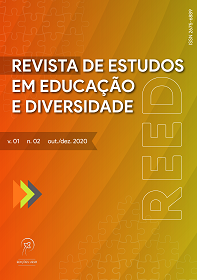SABERES E NÃO SABERES DE PROFESSORES DE LÍNGUA PORTUGUESA: REFLEXÕES SOBRE O ESTADO DO CONHECIMENTO
DOI:
https://doi.org/10.22481/reed.v1i2.7899Palavras-chave:
Saberes docentes, (Não) saberes, Estado do Conhecimento, Língua PortuguesaResumo
Este estudo traz dados de uma pesquisa denominada estado do conhecimento, a partir dos anais do Encontro Nacional de Didática e Prática de Ensino (ENDIPE), utilizando os descritores “Saberes docentes” e “(não)saberes docentes”, com o recorte dos encontros realizados nos anos de 2008 a 2016. Com o objetivo conhecer os saberes e os (não) saberes de professores de Língua Portuguesa (LP), publicados nos anais do Encontro Nacional de Didática e Prática de Ensino (ENDIPE). Fornece um mapeamento quantitativo dos trabalhos que tem abordado a temática saber e não saber docente dentro da área de Língua Portuguesa (LP). Para discussão dos dados, utiliza-se o referencial teórico dos trabalhos de Gauthier (2013), Tardif (2014), Ferreira (2014), para fundamentar, apoiamos também em outros autores que estudam a formação de professores e o ensino de Língua Portuguesa (LP). Os dados da pesquisa mostram que os saberes docentes foram abordados em todos os níveis de ensino e revelam o perfil e os (não) saberes que envolvem a ação docente.
Downloads
Referências
BRASIL. Base Nacional Comum Curricular (versão final). 2017. Disponível em: http://basenacionalcomum.mec.gov.br/images/ BNCC_publicacao.pdf. Acesso em: 20 ago. 2018.
CAMPOS, Lucas Santos. A negação prefixal na história da língua portuguesa. 2004. Tese (Doutorado em Letras e Linguística) - Universidade Federal da Bahia, Instituto de Letras, Salvador – BA, 2004.
CHARLOT, Bernard. Relação com o saber, formação dos professores e globalização: questões para a educação hoje. Porto Alegre: Artmed, 2005.
CUNHA, Antônio Geraldo da. Dicionário etimológico Nova Fronteira da Língua Portuguesa. 2 ed. Editora: Nova Fronteira S.A. Rio de janeiro, 1986.
FALSARELLA, Ana Maria. Sobre a reprodução do não saber. In: XVI ENDIPE - Encontro Nacional de Didática e Prática de Ensino, 2012, SP. Anais [...]. Campinas/SP: ENDIPE (Unicamp), 2012.
FERREIRA, Lucia Gracia. Professoras da zona rural: formação, identidade, saberes e práticas. 1. ed. Curitiba: CRV, 2014.
GAUTHIER, Clermont. Por uma teoria da pedagogia: pesquisas contemporâneas sobre o saber docente. 3.ed. Ijuí, RS: Unijuí, 2013.
LEAL, Leiva de Figueiredo Viana. A enunciação discursiva de professores sobre seus saberes e suas práticas docentes. In: XVIII ENDIPE - Encontro Nacional de Didática e Prática de Ensino, 2016, Cuiabá. Anais [...]. Cuiabá: ENDIPE-UFMT, 2016.
MOROSINI, Marília Costa; FERNANDES, Cleoni Maria Barboza. Estado do Conhecimento: conceitos, finalidades e interlocuções. Educação Por escrito: Porto Alegre, v 5, nº 2, p. 154-164, 2014. Disponível em: https://revistaseletronicas.pucrs.br/ojs/index.php/porescrito/article/view/18875. Acesso em: 13 nov. 2020.
OLIVEIRA, Luciano Amaral. Coisas que todo professor de português precisa saber: a teoria na prática. São Paulo, Ed. Parábola, 2010.
SHULMAN, Lee. Conhecimento e ensino: fundamentos para a nova reforma. Cadernos cenpec: São Paulo, v. 4, n. 2, p. 196-229, 2014. Disponível em: http://cadernos.cenpec.org.br/cadernos/index.php/cadernos/article/view/293. Acesso em: 13 nov. 2020.
TARDIF, Maurice. Saberes docentes e formação profissional. 17 ed. Petrópolis, RJ: Vozes, 2014.
WEISZ, Telma. O diálogo entre o ensino e a aprendizagem. São Paulo: Ática, 2003.
Downloads
Publicado
Como Citar
Edição
Seção
Licença
Você é livre para:
Compartilhar - copia e redistribui o material em qualquer meio ou formato; Adapte - remixe, transforme e construa a partir do material para qualquer propósito, mesmo comercialmente. Esta licença é aceitável para Obras Culturais Livres. O licenciante não pode revogar essas liberdades, desde que você siga os termos da licença.
Sob os seguintes termos:
Atribuição - você deve dar o crédito apropriado, fornecer um link para a licença e indicar se alguma alteração foi feita. Você pode fazer isso de qualquer maneira razoável, mas não de uma forma que sugira que você ou seu uso seja aprovado pelo licenciante.
Não há restrições adicionais - Você não pode aplicar termos legais ou medidas tecnológicas que restrinjam legalmente outros para fazer qualquer uso permitido pela licença.






